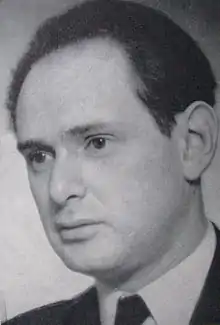Gunnar Heckscher
Gunnar Edvard Heckscher (8 July 1909 – 24 November 1987) was a Swedish political scientist and leader of the Rightist Party (Högerpartiet), which later became the Moderate Party.[1]
Gunnar Heckscher | |
|---|---|
 Gunnar Heckscher in 1959 | |
| Born | 8 July 1909 Djursholm, Sweden |
| Died | 24 November 1987 (aged 78) Uppsala, Sweden |
| Children | Sten Heckscher Ivar Heckscher Einar Heckscher Eva Heckscher David Heckscher |
Biography
Heckscher was born in Djursholm, son of economist Eli Heckscher and writer and teacher Ebba Heckscher. He graduated from Uppsala University in 1927 and obtained a PhD 1934. He lectured in political science at Uppsala between 1933 and 1941 and at what later became Stockholm University between 1941 and 1948. He was Dean of the Social Institute of Stockholm 1945–1954. He became a professor in 1948 and worked at both the Social Institute and at Stockholm University.
Heckscher was a member of the Riksdag for Stockholm between 1957 and 1965.
After having been deputy chairman, Heckscher was elected leader of the party in 1961 and served until 1965. He was an early supporter of Swedish membership of the European Community. He was later the Swedish ambassador to India 1965-1970 and Japan 1970–1975.
Heckscher died in Uppsala on 24 November 1987. One of his sons is Sten Heckscher, Social Democratic politician and later National Police Commissioner.
References
- Heckscher, Gunnar i Vem är det (1985)
| Party political offices | ||
|---|---|---|
| Preceded by Jarl Hjalmarson |
Chairperson of the Rightist Party 1961–1965 |
Succeeded by Yngve Holmberg |
| Diplomatic posts | ||
| Preceded by Klas Böök |
Ambassador of Sweden to India 1965–1970 |
Succeeded by Axel Lewenhaupt |
| Preceded by Karl Fredrik Almqvist |
Ambassador of Sweden to Japan 1970–1975 |
Succeeded by Bengt Odevall |
| Preceded by Karl Fredrik Almqvist |
Ambassador of Sweden to South Korea 1970–1975 |
Succeeded by Bengt Odevall |